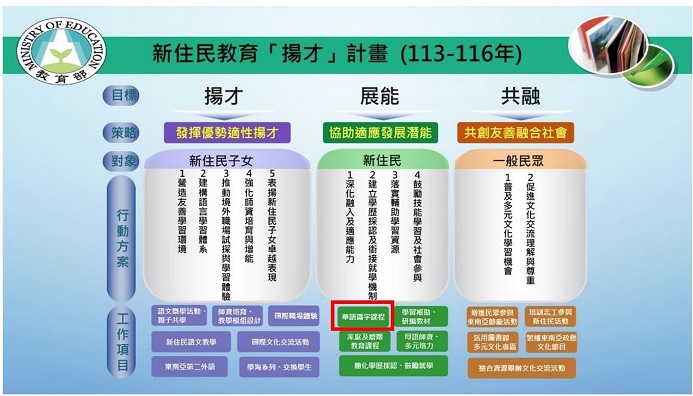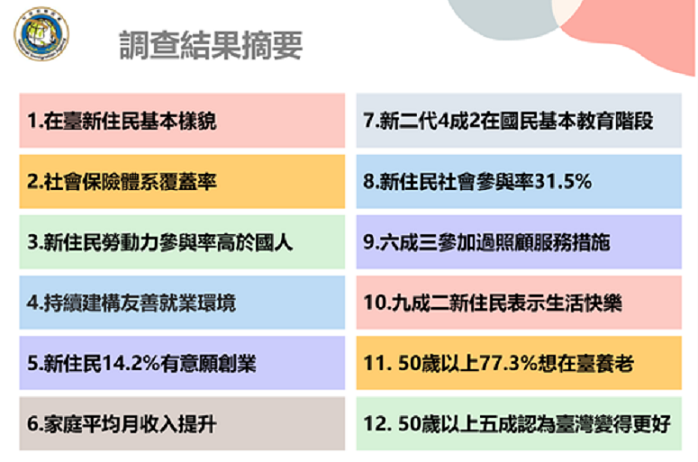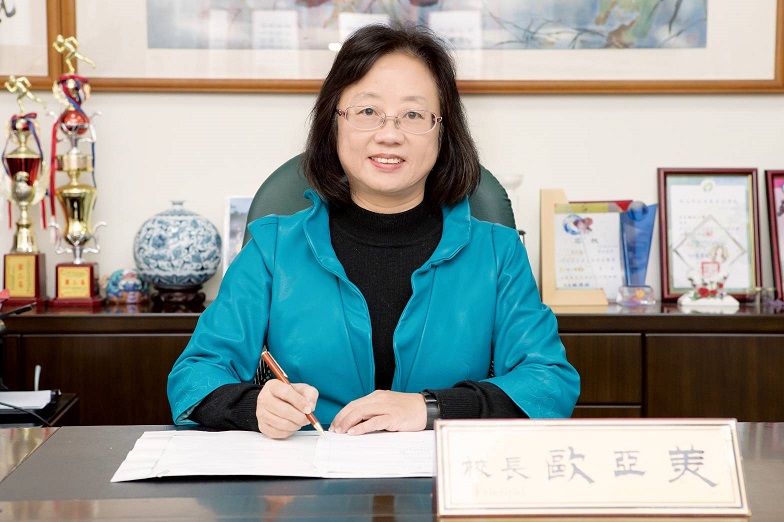According to the Ministry of the Interior's statistics, as of July 2024, there are 600,302 new immigrants in Taiwan due to marriage, including those from Southeast Asia, Mainland China (including Hong Kong and Macau), and other regions (Immigration Agency, 2024). Given that new immigrants in Taiwan take on crucial roles in family care, workplace responsibilities, adapting to life, or promoting culture, the government and civil society have long focused on this issue since the peak of new immigrants arriving in Taiwan in the early 2000s. Relevant policies and regulations have been established to help new immigrants and their children integrate into Taiwanese society, creating a harmonious coexistence between different ethnic groups.
First, in 2012, the Ministry of the Interior launched the New Immigrant Torch Project, which included more than ten sub-projects with funding exceeding NT$100 million. It covers learning about Taiwanese society, the languages, and the cultures of new immigrants. The Foreign Spouse Counseling Fund was established and later replaced by the New Immigrant Development Fund, which currently allocates more than NT$200 million annually for government and private organizations to apply for. It includes four sub-projects: 1) New Immigrant Social Safety Network Service Plan, 2) New Immigrant Family Growth and Childcare, Multicultural Plan, 3) Family Service Center Plan and New Immigrant Innovative Services, and 4) Talent Cultivation and Industry Revitalization Plan. From January to June 2024, 108 applications were submitted, with 90 approved and total funding of NT$92,939,652, classified as follows: 7 applications from the central government (NT$61,008,321), 58 from local governments (NT$27,080,123), and 25 from private organizations (NT$4,851,208).
In addition, in 2014, the Ministry of Education included Southeast Asian languages in primary schools as part of the 12-year compulsory education curriculum, where students must choose from one of four languages: Taiwanese, Hakka, Indigenous languages, or new immigrant languages. In junior high school, these languages are optional, and in high school, they are elective second foreign languages. Currently, nearly 20,000 students are enrolled in these courses nationwide, and over 800 new immigrants and second-generation immigrants serve as support teachers for these language courses. From 2024 to 2027, the Ministry of Education is implementing the "New Immigrant Talent Nurturing Project" with three main goals: to harness talents among new immigrant children, to empower new immigrants, and to foster a friendly and inclusive society. Ministry of Education's "Talent Development Plan" for 2024-2027 (Source: Ministry of Education 2024)
Ministry of Education's "Talent Development Plan" for 2024-2027 (Source: Ministry of Education 2024)
The above policies have been in place for many years. Recently, the "New Immigrant Basic Law" was enacted on August 12, 2024. The first article states that the law is established to safeguard the multicultural spirit of the Constitution, protect and assist new immigrants in integrating into Taiwanese society, and establish harmonious ethnic relations.
Our society is committed to addressing the adaptation needs of new residents by implementing relevant policies and regulations, but do new residents truly feel the impact? According to the results of the 2023 New Resident Life Needs Survey released by the Ministry of the Interior's National Immigration Agency on July 19, 2023 (as shown in Figure 2), the labor force participation rate of new residents is higher than that of the general population. Additionally, 14.2% of new residents expressed interest in starting their businesses, their average household income has increased, and 31.5% of new residents participate in social activities. Furthermore, 63% have used care service measures, 92% of new residents report feeling happy, 77.3% of those over 50 years old wish to retire in Taiwan, and half of those over 50 believe Taiwan has improved. 2023 New Resident Life Needs Survey
2023 New Resident Life Needs Survey
The New Resident Life Needs Survey received positive feedback on satisfaction; however, attention is still needed for areas of dissatisfaction. For instance, 7.9% of new residents reported feeling unhappy. Compared to when they first got married and moved to Taiwan, over half of the respondents believe that societal attitudes, workplace friendliness, and government services or welfare measures have improved, while over 40% feel it remains the same, and 2-3% believe it has worsened. Regarding the rights of new residents in Taiwan, 46.0% feel conditions have improved, 51.2% believe they remain the same, and 2.8% feel they have worsened.
The survey is conducted every five years, providing references for governmental and non-governmental organizations to develop relevant services and policies. The survey covers 22 counties and cities nationwide, involving immigrants with valid residence permits or Taiwanese nationality, excluding those who have been abroad for over two years. The survey included 10,430 valid samples through in-person interviews and focus group discussions.
In conclusion, Taiwan's democratic society emphasizes human rights and the rule of law, with significant protections for citizens. Both government and civil society strive to support new immigrants' adaptation and rights. As an educator deeply involved in multicultural and ethnic harmony education issues, I am committed to these efforts. Although there is progress, areas of improvement remain, and both government and civil society must continue to focus on building harmonious relationships among all ethnic groups.
Author: Ou Ya-mei
Position: Inspector, New Taipei City Government Education Bureau
Education: Ph.D. in Education Policy and Administration, National Taipei University of Education
Experience:
- Principal, Pingding Elementary School, Tamsui District (2017-2024, retired in 2024)
- Convenor, Learning City Project, New Taipei City (2022-present)
- Head, Lifelong Learning Guidance Project Team, New Taipei City (2010-2023)
- Deputy Convenor, New Immigrant Cultural and Educational Guidance Team, New Taipei City (2010-2023)
- Chief Editor of 126 textbooks in seven Southeast Asian languages for the Ministry of Education (2016-2021)
- Project Leader for the Ministry of Education’s Digital Textbook Collaboration in Southeast Asian Languages (2017-2021)
- Curriculum Committee Member for New Immigrant Languages (2014-2016)







